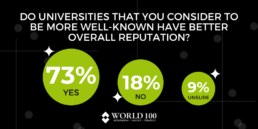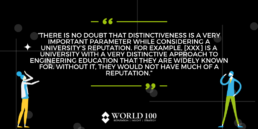The World 100 Network annual research project always aims to push the boundaries of understanding about global university reputation. This year’s project is looking at a topic in academic research on corporate reputation and applying it to higher education, with the aim of helping institutions to think about how they can stand out in a crowded field.
The Centrality-Distinctiveness (C-D) Mapping methodology was applied originally by marketers in the automobile and soft drinks industries – and discussed at the W100 annual conference in 2018 by Professor Niraj Dawar from Western University.
The World 100 project is adapting the methodology to look at how university brands can be mapped according to their centrality in the sector – are they top of mind when an audience thinks about reputable universities – as well as their distinctiveness – a concept that reputation managers are much more familiar with.
The aim is to help Network members understand better how they can stand out with key stakeholders, and to this end, the project involves surveying global academics and prospective students, as well as engaging reputation leaders within our Network. Click here to fill in the survey is you have not yet responded.
The full results of the project will be available later this autumn, but to whet your appetite – and encourage you to fill in the survey for members – we are sharing some initial results from the first audience surveyed, global academics.
Want to continue reading?
The rest of this content, and much more, is only available to our members. Consider becoming a member today…
If you are already a member please login to view this content.
Through a survey of qualitative and quantitative questions, we set out to explore perceptions held by academics on the brand positioning of W100 member universities and what they think universities can do in order to stand out.
What have we learned so far?
We received 1,255 academic responses for this survey, with good representation from all fields of expertise. Respondents were contacted through Times Higher Education’s database of global published academics, and the sample was regionally balanced.
The initial results of this research indicate that, for most universities, academics judge centrality and distinctiveness at similar levels. Scored on a scale of 0 to 10, where 10 indicates high centrality (or very well-known) or high distinctiveness, there was an average variation of 0.3 between centrality and distinctiveness scores.
However, this isn’t the case across the board. Exceptions to the rule include institutions that specialise in particular academic areas, such as the London School of Economics and Political Science, and RCSI University of Medicine and Health Sciences, which both had lower awareness but were considered more distinctive.

Breaking the results down by specific fields of expertise also produced some interesting results.
The research also delves into the reasons given by global academics when judging the reputation of universities. The majority of academics (73%) answered yes to the question “do universities that you consider to be more well-known have better overall reputation?” This supports the findings of previous World 100 research with academics who respond to the reputation surveys that feed the global rankings.
Verbatim comments support this theme, with academics claiming “reputation is synonymous with being well-known”, and that “there is a positive feedback loop – generally, reputable universities are better known”. However, a few academics also noted the danger in assuming the link: “Even if it is true that usually, a well-reputed university is also well-known, the converse is not true: a not well-known university might have (for instance in a given field) a good reputation.”
When asked to elaborate on the importance of distinctiveness, many academics did consider there to be a specific link with reputation. “There is no doubt that distinctiveness is a very important parameter while considering a university’s reputation. For example, [xxx] is a university with a very distinctive approach to engineering education that they are widely known for. Without it, they would not have much of a reputation.”
However, others had a more nuanced view: “it depends on the nature of the distinctiveness: if it is distinctive due to innovation and novel approaches ideas, then yes, a university can be considered reputable.”

Next Steps
A further survey with a sample of global prospective students is currently in field, asking similar questions to help us gain a better understanding of perceptions of university brand positioning.
We are also asking all members to fill in a final survey to help us map perceptions of member universities against those of the other key audiences.
The final report will include Centrality- Distinctiveness maps covering all World 100 member universities, with the data cut by country/ region and key subject areas.
Some further observations from the data will be presented in a session at the forthcoming World 100 Network Annual Conference in Montreal.
Please contact us at research@theworld100.com if you have any queries about the research.

